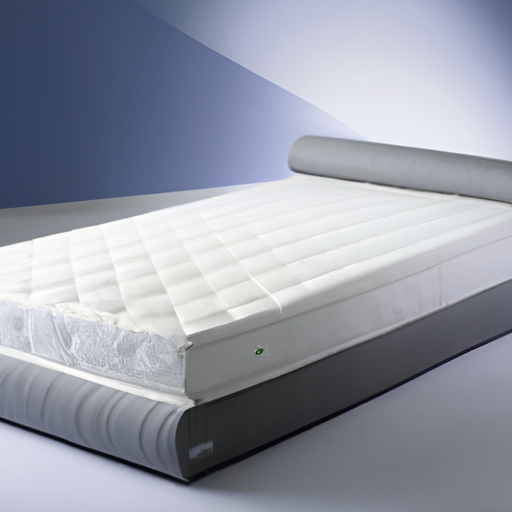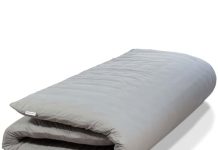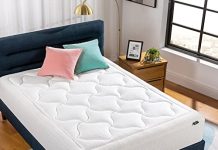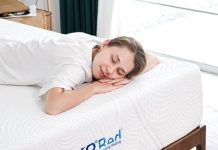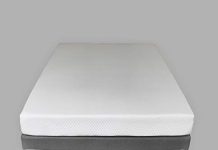Are you in search of a mattress that perfectly suits your sleeping preferences? Look no further, as we have the answer to your quest: roll up mattress options. These innovative and convenient mattresses come in a range of firmness levels, allowing you to find the perfect balance between firm and soft. Whether you prefer a firm and supportive surface or a plush and cozy feel, there is a roll up mattress option out there waiting to provide you with a blissful night’s sleep. In this article, we will explore the different firmness levels available in roll up mattresses, helping you make an informed decision for your sleep sanctuary. So, get ready to discover the perfect firmness for your sleep needs and enjoy a restful night’s slumber!
Review contents
What are roll up mattresses?
Definition
Roll up mattresses, also known as bed-in-a-box mattresses, are a convenient and innovative approach to mattress shopping. These mattresses are compressed, vacuum-sealed, and rolled into a compact package, allowing for easy shipping and setup. Once the package is opened, the mattress unfolds and expands to its full size, ready for a good night’s sleep. Roll up mattresses are becoming increasingly popular due to their convenience and affordable pricing.
Benefits
Roll up mattresses offer a range of benefits that make them an attractive option for many sleepers. Firstly, their compact packaging allows for easy transportation, making them ideal for individuals who move frequently or have limited transportation options. Additionally, roll up mattresses often come at a lower price point compared to traditional mattresses, making them budget-friendly without compromising on quality. Furthermore, they offer a wide range of firmness options, catering to various sleep preferences and body types. Lastly, the compressed packaging ensures a hygienic and pristine mattress that is free from dust and allergens, promoting healthier sleep environments.
Popular brands
Several established and reputable brands offer roll up mattresses. These brands focus on delivering high-quality products that meet the needs and preferences of sleepers. Some popular roll up mattress brands include Casper, Tuft & Needle, Purple, and Nectar. These brands have gained recognition for their commitment to comfort, durability, and customer satisfaction. It is essential to research and read reviews to find the brand that aligns with your preferences and requirements.
Factors influencing firmness and softness
Material composition
The material composition of a roll up mattress plays a significant role in determining its firmness or softness. Common materials used in these mattresses include memory foam, latex, and hybrid combinations. Memory foam mattresses typically offer a softer feel, contouring to the body’s shape and relieving pressure points. On the other hand, latex mattresses provide a bouncier and more responsive feel, offering a balance between support and comfort. Hybrid mattresses combine various materials, such as pocketed coils and memory foam, to provide a blend of support and cushioning.
Thickness
The thickness of a roll up mattress contributes to its firmness level. Thicker mattresses tend to be softer and provide deeper sinkage, making them suitable for sleepers seeking a plush feel. Thinner mattresses, on the other hand, offer a firmer surface and are often preferred by sleepers who prefer a more supportive feel and less sinkage. It is essential to consider personal preferences and body weight when selecting the appropriate thickness for a roll up mattress.
Support layers
The support layers within a roll up mattress play a crucial role in determining its firmness level. These layers typically consist of coils or high-density foam that provide the necessary support for the body. A mattress with more support layers will offer a firmer feel, ideal for sleepers who need additional support for their back or joints. Conversely, mattresses with fewer support layers will provide a softer feel, allowing for greater contouring and sinkage.
Foam density
Foam density is another factor to consider when evaluating the firmness or softness of a roll up mattress. Higher foam density generally indicates greater durability and support, resulting in a firmer feel. Lower foam density, on the other hand, provides a softer and more plush sensation, offering a greater level of sinkage. It is important to keep in mind that foam density alone does not determine the overall comfort of a mattress, as other factors such as material composition and thickness also come into play.
Different firmness levels
Firm
Firm roll up mattresses offer a sturdy and supportive surface. These mattresses are designed to minimize sinkage and provide a more substantial feel. Firm mattresses are often recommended for sleepers who prefer sleeping on their back or stomach, as they help maintain proper spinal alignment. Additionally, individuals with higher body weight may benefit from a firmer mattress as it offers better support and prevents excessive sinkage.
Medium
Medium firmness roll up mattresses strike a balance between support and comfort. These mattresses provide a moderate level of sinkage and contouring, allowing for pressure relief while maintaining adequate support. Medium firmness is a popular choice for sleepers who transition between different sleeping positions or those who have no specific firmness preferences.
Plush
Plush roll up mattresses offer a luxuriously soft and cushioned feel. These mattresses provide deep sinkage, conforming closely to the body’s contours and relieving pressure points. Plush mattresses are particularly suitable for side sleepers, as they provide excellent comfort and pressure point relief on the shoulders and hips. However, individuals who prefer a firmer feel or those with back or joint pain may find plush mattresses too soft and lacking adequate support.
Adjustable firmness
Some roll up mattresses come with adjustable firmness options, allowing sleepers to customize the feel based on their preferences. These mattresses typically feature multiple layers or zones with different firmness levels, enabling users to customize their sleep experience. Adjustable firmness mattresses are ideal for couples who have different firmness preferences or sleepers who frequently change their firmness levels.
Testing firmness and softness
Subjective feel
When evaluating the firmness and softness of a roll up mattress, subjective feel plays a crucial role. Sleepers’ personal preferences, body weight, and sleeping positions all contribute to their perception of firmness and softness. It is important to try out mattresses before making a purchase, either by visiting a showroom or taking advantage of sleep trials offered by online mattress retailers.
Firmness scale
To provide a standardized measure of firmness, manufacturers often assign a number on a firmness scale to their mattresses. This scale typically ranges from 1 to 10, with 1 being extremely soft and 10 being extremely firm. Different brands may have slightly different interpretations of the scale, so it is essential to refer to each brand’s specific guidelines to accurately assess the firmness level.
Laboratory tests
Laboratory tests are conducted to obtain objective measurements of firmness and softness. These tests involve using specialized equipment to assess factors such as pressure point relief and sinkage. While helpful in providing additional information, it is important to note that laboratory tests cannot replicate the subjective experience and personal preferences of individual sleepers.
Pros and cons of firm mattresses
Benefits
Firm mattresses offer several benefits that cater to specific sleep needs. Firstly, they provide excellent support, promoting proper spinal alignment and reducing back pain. Firm mattresses are especially recommended for stomach sleepers, as they help prevent excessive sinking of the hips, keeping the spine in a neutral position. Additionally, individuals with higher body weight may find firmer mattresses more comfortable, as they offer better support and prevent sagging.
Drawbacks
While firm mattresses have their advantages, there are also a few drawbacks to consider. Some sleepers may find firm mattresses too hard and uncomfortable, especially if they prefer a softer, plush feel. Additionally, individuals with specific medical conditions, such as arthritis or fibromyalgia, may find firm mattresses exacerbate their symptoms due to the lack of pressure relief. It is important to strike a balance between support and comfort to ensure a good night’s sleep.
Pros and cons of soft mattresses
Benefits
Soft mattresses offer unique benefits that appeal to specific sleep preferences. The deep sinkage and contouring provided by soft mattresses offer excellent pressure point relief, particularly for side sleepers. This can alleviate discomfort in areas such as the hips and shoulders, promoting better sleep quality. Soft mattresses are also suitable for individuals who prefer a more plush and hugging sensation during sleep.
Drawbacks
Despite their advantages, soft mattresses have some drawbacks that need to be considered. The deep sinkage can make it challenging to change sleeping positions, potentially disrupting sleep. Soft mattresses may not provide adequate support for individuals who require additional spinal alignment, such as back sleepers. Furthermore, soft mattresses may lack the necessary firmness to prevent excessive sagging or sinking, which can lead to discomfort and pain in the long run.
Who benefits from firm mattresses?
Stomach sleepers
Stomach sleepers often benefit from firm mattresses, as they help maintain proper spinal alignment. Firm mattresses prevent excessive sinking of the hips, ensuring the spine remains in a neutral position. This reduces the risk of developing back and neck pain commonly associated with stomach sleeping.
Back sleepers
Back sleepers can also benefit from firm mattresses. The firm surface provides the necessary support for the spine, preventing it from sinking too deeply into the mattress. This helps maintain proper alignment and reduces the risk of developing back pain.
Heavier individuals
Heavier individuals often benefit from firm mattresses’ additional support. The firmness helps distribute weight evenly, preventing excessive sinkage and sagging. This ensures proper spinal alignment and reduces the risk of discomfort and pain associated with inadequate support.
Who benefits from soft mattresses?
Side sleepers
Side sleepers often prefer soft mattresses due to their excellent pressure point relief. The deep sinkage and contouring provided by soft mattresses alleviate pressure on the hips and shoulders, promoting better sleep quality and reducing the risk of pain or discomfort.
Lighter individuals
Lighter individuals may find soft mattresses more comfortable due to their ability to provide deep sinkage and conform to the body’s contours. A softer surface can offer a plush and enveloping feel, promoting a cozy and comfortable sleep environment.
Pressure point relief
Individuals who experience pressure points, such as those with arthritis or joint pain, may benefit from soft mattresses’ ability to provide pressure point relief. The cushioning and contouring nature of soft mattresses can alleviate discomfort and pain in sensitive areas of the body.
Preference for different sleeping positions
Recommended firmness levels for back sleepers
Back sleepers typically benefit from medium to firm mattresses, as these provide the necessary support to maintain proper spinal alignment. This firmness level ensures the hips do not sink excessively and reduces the risk of developing back pain. However, personal preferences and body weight should also be considered when determining the ideal firmness level.
Recommended firmness levels for side sleepers
Side sleepers generally find medium to soft mattresses most comfortable, as they provide excellent pressure point relief on the hips and shoulders. Soft mattresses allow the body to sink deeper, aligning the spine and reducing the risk of discomfort. However, side sleepers may prefer a slightly firmer mattress if they require additional support for their lower back.
Recommended firmness levels for stomach sleepers
Stomach sleepers typically benefit from firm mattresses, as they prevent excessive sinking and promote proper spinal alignment. Firm mattresses help support the hips and prevent them from sinking too deeply, reducing strain on the lower back. However, personal preferences and body weight should also be taken into account to ensure optimal comfort.
Conclusion
Roll up mattresses offer convenience, affordability, and a wide range of firmness options. Understanding the factors influencing firmness and softness, as well as the benefits and drawbacks of different levels of firmness, helps individuals make informed decisions when selecting a mattress. Consider personal preferences, sleeping position, body weight, and any specific requirements when determining the most suitable firmness level for a roll up mattress. By doing so, customers can enjoy a comfortable and restful night’s sleep, leading to improved overall well-being and quality of life.

